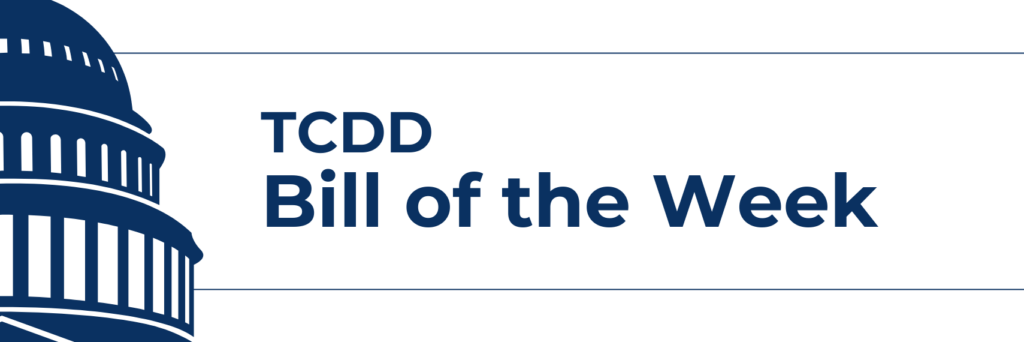
Table of Contents
For this weekly feature, the Texas Council for Developmental Disabilities (TCDD) profiles a noteworthy bill going through the legislative process. The bill may relate directly to TCDD’s Public Policy Priorities or another disability-related issue.
Bill of the Week: HB 2310
House Bill (HB) 2310, relating to developing a strategic plan to improve and expand early learning and educational opportunities for young children with disabilities. HB 2310 was authored by Rep. Claudia Ordaz from El Paso, District 79.
Share This Bill
We’ve created a Bill of the Week one-pager (PDF) for HB 2310. This is a simplified explanation of the bill that you can share with your representative and personal network.
Background
Texas families, particularly those with children with disabilities, face significant and complex challenges in accessing quality early childhood education and inclusive child care. Some of these challenges include:
- difficulty in finding child care and pre-k programs that accept children with disabilities;
- knowledge gaps and cultural barriers that limit communication and coordination between families, child care providers, and early childhood intervention (ECI) providers; and
- barriers when children transition out of ECI at age 3 and into early childhood special education services for ages 3-5.
As shown by Texans Care for Children (PDF), three state agencies oversee the following programs:
- The Texas Education Agency (TEA) oversees the public pre-k and Early Childhood Special Education programs.
- The Texas Workforce Commission (TWC) oversees the Child Care Services Program and Texas Rising Star, the state’s child care quality rating and improvement program.
- The Texas Health and Human Services Commission (HHSC) oversees the ECI program for infants and toddlers with disabilities and Child Care Regulation (CCR), which establishes and enforces minimum child care licensing standards.
Gaps in collaboration between these agencies have worsened barriers for families seeking services for children with disabilities. Advocates suggest that these barriers should be addressed through better coordination and planning.
What does the bill do?
HB 2310 would amend the Education Code to require TEA, in collaboration with HHSC and TWC, to develop and implement a four-year strategic plan to improve early learning and educational opportunities for young children with disabilities or developmental delays.
The bill specifies that, in developing the strategic plan, the agencies must:
- Develop strategies to include children with disabilities in early childhood education settings.
- Identify existing barriers and policies that hinder effective inclusion of children with disabilities in early learning programs, such as pre-k, early childhood special education settings, and child care programs that participate in TWC’s subsidized child care initiative.
- Coordinate with state, regional, and local agencies, the governor’s Texas Early Learning Council, nonprofit organizations, and relevant social service providers.
HB 2310 further stipulates that the strategic plan must include strategies for inclusion endorsed by the heads of the three agencies. The plan will include a description of existing barriers that limit effective inclusion in early learning programs and recommendations for any changes necessary for improvement. The plan must also recommend strategies to:
- improve provider staffing, training, sustainability, and effectiveness across public schools, child care programs, and ECI providers that serve young children with disabilities;
- effectively leverage existing funding and resources;
- streamline the transition for families from ECI to early childhood special education programs — and then into special education programs; and
- improve collaboration and partnerships between child care programs, ECI providers, and public schools.
If passed, HB 2310 would take effect on Sept. 1, 2025. The initial strategic plan would be published by Sept. 1, 2026, on the three agencies’ respective websites and shared with the governor, lieutenant governor, and speaker of the Texas House. The strategic plan would be updated every four years.

“I’ve spoken with advocates and parents about the challenges families face when early childhood services for children with disabilities and delays are hard to navigate between the services offered by TEA, TWC, and HHSC. By bringing these three agencies together, HB 2310 can ensure our tiniest Texans receive the support and care they need.”
Rep. Claudia Ordaz, HB 2310 author
Where is the bill in the process?
On April 22, 2025, HB 2310 was favorably reported by the House Committee on Public Education. The bill is waiting to be scheduled for consideration by the full Texas House.
HB 2310 received a public hearing on April 8. You can watch the discussion on it here, beginning at the 0:56:00 mark.
Who supports the bill and why?
The following comments were provided at the April 8 hearing on HB 2310:
Texans Care for Children: David Feigen, director of early learning policy for Texans Care for Children, testified in support of the bill. He emphasized the critical role that early learning programs play in the lives of young children with disabilities. Feigen explained that when a child enrolls, “their world really opens up and they begin interacting with adults and other children outside their family.” He stated that these experiences are particularly important to young children with disabilities.
Feigen described the difficulties that families often face in finding appropriate, supportive care for children with disabilities. He shared the story of one family who described the massive time commitment the search required, including “dozens of hours of research, time off work when her child was disenrolled from programs because they could not accommodate his needs, and indescribable angst.” The family worried that either parent would have to leave the workforce to provide full-time care for their son. After bouncing between six different early education programs, the family finally reached the top of a two-year waitlist for an inclusive preschool that was suitable for their child, Feigan shared. Though the final outcome of the story was positive, Feigen explained that the family’s stressful journey was indicative of a broader systemic issue that would benefit from HB 2310’s strategic plan.
The Arc of Texas: Michael Clarke, deputy director of public policy and advocacy for The Arc of Texas, testified in favor of the bill. He suggested that the development and implementation of the strategic plan would be “a significant step forward in ensuring that all children in Texas have access to a strong early educational foundation.” He indicated that the bill’s focus on identifying and addressing barriers to inclusion, and promoting effective inclusion of children with disabilities, would be critical to improving long-term outcomes.
The following groups also registered their support for the bill: Age of Learning, Association of Texas Professional Educators, Autism Society of Texas, Children at Risk, Disability Rights Texas, Every Texan, Methodist Healthcare Ministries, National Association of Social Workers-Texas, Texas AFT, Texas Association of Business, Texas Association of Community Schools, Texas Association of School Psychologists, Texas CASA, Texas Council of Administrators of Special Education, Texas Council of Community Centers, Texas Medical Association, Texas PTA, Texas State Teachers Association, United Ways of Texas, and others.
Who opposes the bill and why?
There was no registered opposition to the bill.
Additional Testimony
The following comments were offered on the bill at the April 8 hearing:
TCDD: Lauren Gerken, a senior public policy analyst for TCDD, testified on the bill. She shared details of TCDD’s participation in a monthly workgroup consisting of advocacy partners, child care providers, and legislative representatives reviewing some of the common issues and barriers in child care. She indicated that those barriers cut across the work of the three agencies, and they could be better addressed through the bill’s provisions.
“The development and success of children with disabilities are heavily dependent on the quality of services they receive from birth to age five,” Gerken said in her written remarks. “We believe that promoting collaboration and strategic planning is essential to achieving that shared goal.”
Additional Information
TCDD has identified early childhood and inclusive education as one of its public policy priorities for the 89th Texas Legislature:
Ensure children with disabilities ages 0-22 receive necessary services to promote healthy growth and development to support long-term success and independence. Children with disabilities in Texas deserve access to quality care and education such as inclusive childcare, therapy and case management services, special education services, and transition planning, which meet or exceed federal standards to increase childhood and long-term outcomes.
How much will the bill cost?
The Legislative Budget Board found that HB 2310 would not impact the state budget in a significant way.
Is there a Senate companion to the bill?
There is no Senate companion to HB 2310.
Stay Informed
For the latest information about where HB 2310 is in the process, follow the bill on the Texas Legislature Online. To receive future legislative updates from TCDD, follow us on Facebook, X, Instagram, and LinkedIn.
Bill of the Week Updates
Here is an update on previous TCDD Bills of the Week for the 89th legislative session.
HB 1936 was favorably reported by the House Transportation Committee on April 25 and awaits scheduling for consideration by the full Texas House. The bill would strengthen the enforcement of accessible parking violations.
HB 2081, which would establish the Building Better Futures Program for students with IDD, was passed by the Texas House on May 1. It now heads to the Senate for consideration. Its Senate companion, Senate Bill (SB) 1679 by Sen. José Menéndez, received a public hearing in the Senate Education K-16 Committee on May 1 and was left pending. When a bill is left pending, this means that the committee did not vote on the bill, and it could be considered again at a future committee meeting.
HB 2807 passed the House on May 1. The bill, which would establish a statewide coordinating council for intellectual and developmental disability services, now heads to the Senate for consideration.
SB 769, which would require the Texas Higher Education Coordinating Board to issue a report on the enrollment and success of students with disabilities in higher education, passed the House on April 29. It now returns to the Senate. The Senate will decide whether to agree with an amendment placed on the bill in the House or instead go to a conference committee to work out the differences between the two versions.
